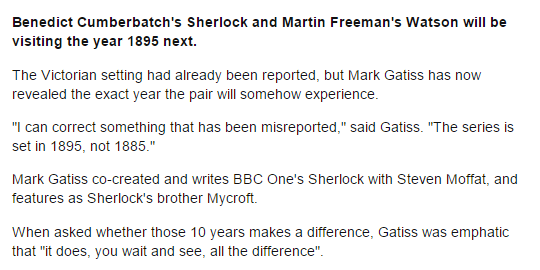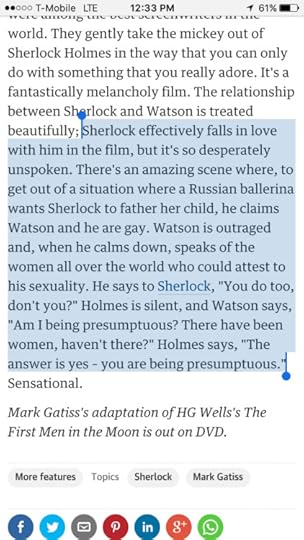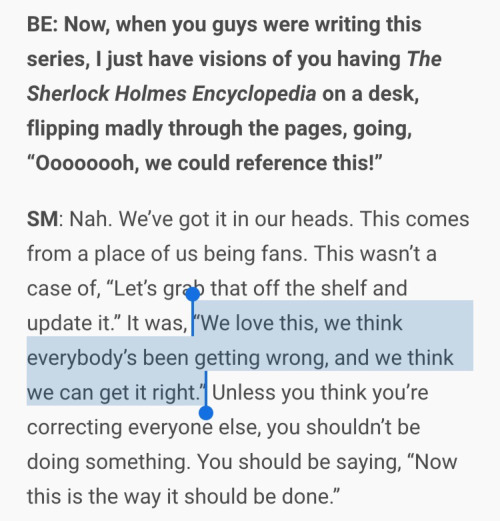XistentialAngst's Blog, page 202
January 5, 2016
This is irrational but your turning 46 post gives me hope - I am only half your age but people are always telling me that being obsessed about a book or a fandom is a phase and will pass, and that when I get older I won't have the passion, but you are olde
Yeah, they’re talking bollocks. Fight to keep your passion, don’t let others make it fade.
Lovey! Here's a question. What do you make of this dialogue from TAB? "Are you even in a fit state?" "For Mary of course, never doubt that Watson; never that." If he's jealous of, or prickly towards Mary at all for having 'taken' John away, why does he s
This has been niggling at me too!
Okay, so, some initial thoughts. It’s very specific what he says. ‘Never doubt that Watson. Never that.’ I think what he’s acknowledging here is that he will always put John’s happiness, or what he THINKS is John’s happiness i.e Mary, before his own. Sherlock must absolutely hate Mary and what she means to John, but as we’ve seen in HLV, he desperately squashes down all of those emotions and does his best to make their wedding absolutely perfect. He puts Mary before himself, and always will, for as long as he thinks that that is what John wants.
The thing is, I can’t decide whether or not Sherlock knows in his fever dream that Mary is bad news. I mean he’s got John and Mary unhappily married, he’s got all the visual clues for Mary being the abominable bride &/or Moriarty. We’ve had ‘that wife, John Watson is definitely in danger!’ But I still don’t think he fully acknowledges how dangerous she is, at least on a conscious level. He can’t have, if he was prepared to leave John with Mary when he was sent off on his suicide mission. I think he still believes that Mary is who John really wants. Series 4 will let him realise otherwise.
As for what you said about ‘the problems of your future’ line, I think you’re absolutely spot on. Whether or not it’s subconscious I think it’s a definite indication that Sherlock will always be prepared to do SOMETHING about Mary. No matter how physically and emotionally exhausted he is, he will always be ready to put John’s needs first, and he will always be ready/prepared for her. ‘Never doubt that, Watson. Never that.’
MARY IS MORIARTY. JIM IS MORAN.
MISSY IS THE MASTER.
SHUT UP
[I mean this is the best possible way i.e. O M G]
johnthreecontinents:
this is all it really takes for me to...
1895 and The Abominable Bride

The above screenshot is taken from an article from April last year. I want to return to it now because it now seems clear to me that the
1895
setting is even more relevant to TJLC than we anticipated.
At the time of this revelation, many people, myself included, made the connection between 1895 and Oscar Wilde’s trial (see my post and the first section in @multifandom-madnesss‘s TAB meta masterpost for more details). Some people have disregarded this connection since the episode aired on the grounds that Wilde was not mentioned, but I think this was a mistake for one simple reason: there was really no other reason for the episode to be set in 1895, and in fact much more reason for it not to be.
There are two other reasons why the writers might have set the special in 1895: a) to align with certain events in the canon or b) to align with a different actual historical event. Neither of these are the case.
John, Sherlock and various other characters refer to The Adventure of the Blue Carbuncle throughout the episode, along with The Hound of the Baskervilles, in a way that suggests that they were recent cases, but both cases are set in 1889, the year after Watson met Mary Morstan. It would then seem to make more sense for the Victorian parts of the episode to be set in 1890, but instead the writers have deliberately chosen not to follow the canon’s chronology. Although that chronology itself is dubious due to Sir Arthur Conan Doyle’s disinterest in continuity, the fact that the writers pulled out three cases set close together but not to set their own narrative in a similar period suggests that they see the year 1895 as significant in its own right. The episode is also not set in 1895 due to the unsolved case of Emilia Ricoletti because she was not a real person - Sir Arthur Conan Doyle invented her and mentioned her in The Adventure of The Musgrave Ritual as part of a case on which Holmes worked before he and Watson met. It follows, then, that 1895 is significant for another reason.
There is, of course, Vincent Starett’s 221B, which famously ends:
‘Here, though the world explode, these two survive,
And it is always eighteen ninety-five.’
Some people therefore understand the setting of TAB as the writers’ means of paying homage to this poem, but I would suggest that they’re in fact doing the opposite - proving the extent to which their adaptation abandons this sentiment.
“Poetry or truth?” Sherlock asks of Lestrade.
“Many would say they’re the same thing,” Lestrade replies.
“Yes,” Sherlock says, “idiots.”
Poetry is not the basis of this narrative.
In case that wasn’t clear enough, the episode ends with Sherlock and John in 221b in Baker Street, discussing Victorian Sherlock’s ‘dream’ of life in the 21st century.
“Perhaps I was being a little fanciful, but perhaps such things could come to pass. In any case, I know I would be very much at home in such a world,” Sherlock tells John.
“I don’t think I would be,” John replies.
“I beg to differ, but then I’ve always known I was a man out of his time,” Sherlock says, and we’re taken outside and back to the 21st century, where Sherlock belongs.
It isn’t always 1895. The world has moved on and the writers have taken Sherlock Holmes with it, from the year in which, Oscar Wilde being on trial, it was one of the most dangerous times to be a gay or bisexual man in London (which, as it happens, canonical Holmes and Watson weren’t) to a time in which Sherlock-“I thought you understood everything?”-“Of course not, that would be
an appalling waste of brain space, I specialise”-Holmes can deem it more important to understand gay fashion trends (as demonstrated through his deductions regarding ‘Jim from IT’) than that the earth orbits the sun.
In that world (our world), however, 1895 remains significant to Sherlock.
“I was running an experiment,” he tells John, Mary and Mycroft, “how would I have solved the case if I’d been there in 1895?”
“Oh, Sherlock,” Mycroft says.
“I had all the details perfect. I was there, all of it, everything!” Sherlock goes on. “I was immersed.”
“Of course you were,” Mycroft says.
Then Mary cuts in: “You’ve been reading John’s blog, the story of how you met.”
This all comes after Sherlock referring to the case of Emilia Ricoletti as one “from 100 years ago,” but he then specifies that he’s in fact talking specifically about 1895, then Mycroft expresses understanding that he would immerse himself in a case from that year, and then Mary brings us back to the present by commenting that before he disappeared into his mind palace, Sherlock had been immersed in a different time - the time he and John met.
In 1988, Neil Bartlett published a book called Who Was That Man?: A Present for Mr Oscar Wilde in which he discusses the ongoing relevance of Oscar Wilde’s life to the life of gay Londoners in the late 20th century, and almost everything he discusses remains relevant today. In one chapter, entitled ‘Evidence’, he writes that Wilde ‘was sentenced by being found guilty. That is, instead of being publicly declared meaningless’ (as was often the outcome of indecency accusations concerning men who were not already famous, since people generally preferred to simply pretend that same sex attraction did not exist) ‘the life of the defendant was found to be full of the worst meanings imaginable.’ This he compares to contemporary gay experience in that ‘we are scrutinized; the details of our lives can only ever be the details of a scandal.’
Is that precise worry not central to TRF? We see it echoed in lines like “Okay, this is too much. We need to be more careful” and “You and John Watson – just platonic? Or can I put you down for a “no” there, as well?” Wilde’s trial haunts Sherlock, as Gabe @johnlocktentacles explains - it is the shadow that defines Sherlock’s every sunny day.
How appropriate, then, that TAB is quite literally about blowing ghosts away and putting the dead to rest. The drama peaks with a revisit to TRF, with Sherlock about to be pulled to his death by Moriarty as he says that “it has to be together, doesn’t it? At the end, it’s always just you and me” when John interrupts, reminds Moriarty that “there’s always two of us” and that that two does not include him, and rescues Sherlock.
Sherlock responds with “thank you, John,” to which John asks “since when do you call me John?”
“You’d be surprised,” Sherlock says.
“No I wouldn’t,” John replies.
Men using one another’s first names was a sign of intimacy generally deemed inappropriate in the late 19th century, but here it’s made to seem perfectly natural.
Through TAB, the writers blow away the cobwebs of 1895 and all of its ongoing connotations. The message they are communicating seems quite clear: Sherlock and John do not have to live with the restrictions and fear (“wisdom in the face of danger”) that Holmes and Watson did. They are free to love one another openly - and it’s about time they did.
Love this: “
The message they are communicating seems quite clear: Sherlock and John do not have to live with the restrictions and fear (“wisdom in the face of danger”) that Holmes and Watson did. They are free to love one another openly - and it’s about time they did.
“
57circlesofhell:
I’m sorry but them talking by the fireplace is so…that is sherlock’s heart. That...
I’m sorry but them talking by the fireplace is so…that is sherlock’s heart. That is his heart.
Yes. Lovely, isn’t it?
Thanks for "Thank you, Wilder"! Question: Thinking about Moriarty saying to Sherlock "It's not the fall that kills you, you, of all people, should know this. It's not the fall, it's never the fall. It's the landing." made me wonder whether possibly Sherloc
This is an interesting theory, thanks for writing in, nonny! I think the special has a lot of people looking back at old episodes and wondering what is real and what isn’t. (Or, what is sober and what isn’t.) Personally, I’m of the opinion that what occurred in old episodes is all reality based (except for those mind palace scenes which are also obviously notated). The reason I think this isn’t from anything on screen, just that if they actually went for this plot device, I think the viewing audience would be really fucking mad at Moffat and Gatiss for being so manipulative. Doing the “it was all just in my head/a dream/a drug trip” is a writing trope that has to be used very judiciously because it can easily turn into a cliche, and one that feels cheap. Also, series 3 opened up some great plot developments, so why would the writers want to throw all that complexity away? I personally doubt they would. Just my opinion though. If you have a theory, write it up! More contributors in fandom is always better!
January 4, 2016
"I’m telling you – 2016 television is downhill from here on.
From a negligible half-line in one of..."
I’m telling you – 2016 television is downhill from here on.
From a negligible half-line in one of the 60 stories by Arthur Conan Doyle about Sherlock Holmes – the detective mentions “the case of Ricoletti of the club foot and his abominable wife” as he’s going through old files in The Adventure of the Musgrave Ritual – Mark Gatiss and Steven Moffat built 90 minutes of the fastest, funniest, flashiest, cleverest, most demanding, ridiculous and brilliant drama there is likely to be until … well, possibly until the next Sherlock comes along, sometime in 2017 we are told…
It was never twins. There were doubles, and doublings-back, and parallels aplenty, there were storylines nesting inside storylines nesting inside storylines, dreams inside realities and out again, there were riffs on the riffs we know from the “real” series – the detective plucks imaginary cuttings from the air instead of websites and images and Watson is summoned by Holmes via telegram instead of text (“Come at once. If convenient. If not convenient, come all the same” – because Sherlock is a constant) – but never twins.
It was an utterly dazzling display, with bravura performances from the actors – Cumberbatch and Scott’s first scene together being among the finest they have ever had – and the plotting (if you stayed with it, and if you didn’t – no matter. That’s what the rewind button’s for. In the meantime, just marvel at the treasures being poured out before you) was a thing of wonder.
…In the meantime, let’s enjoy the fact that there was a joyous and sumptuous celebration of what television and talent that trusts in itself can do, all tipped out in one gorgeous, unstoppable rush. Watching it was like plunging down the Reichenbach Falls.
Missed you.
-
The Guardian, “Sherlock’s back and it’s fast, fun, flashy, fantastic,” [x]
(via thecutteralicia)
Yay! They get it.
caitlinisactuallyawritersname:
I just realised the reason I don’t feel compelled to rush off and...
:
I just realised the reason I don’t feel compelled to rush off and write fix-it fic is because the special was a fix it fic
I know, right? What is left to say? :-)
In the MP graveyard scene Mycroft says "Cherchez la femme," and upon rewatching THoB Sherlock says "Cherchez le chien," when he has his anxiety attack at the inn after he claimed to see the hound. What do you make of it? Coincidence?
Hmmm. Well, certainly it’s supposed to reference the THoB moment, perhaps reminding us that Sherlock is scared and drugged (reminding us that this is not a real scene), but other than what I wrote in my Graveyard meta, I’m not really sure it’s meant as anything other than various aspects of past episodes leaking into his brain. BUT, I’m certain there’s more to it than that, and am interested in learning more.
Anyone have any thoughts on this?
XistentialAngst's Blog
- XistentialAngst's profile
- 15 followers






